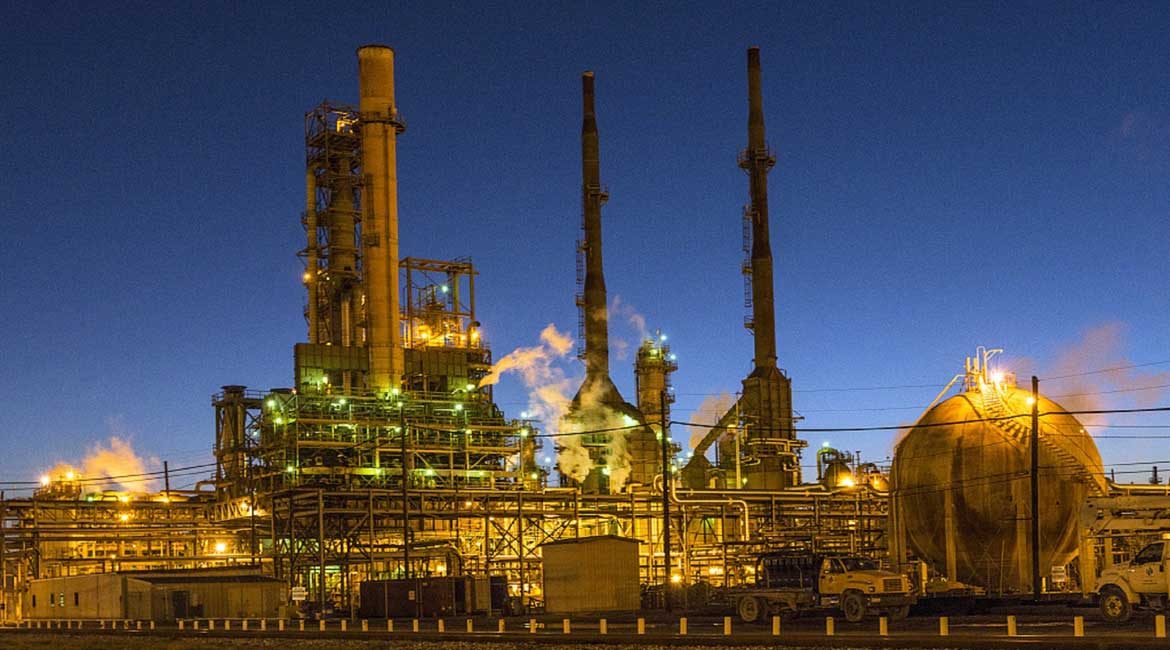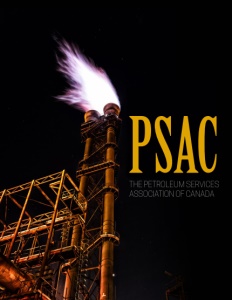Business View Magazine interviews Mark Salkeld, President and CEO of the Petroleum Services Association of Canada, as part of our focus on Canadian energy.
The Petroleum Services Association of Canada (PSAC) is the national trade association representing the service, supply, and manufacturing sectors within the upstream, or exploration and production sector, of the petroleum industry – businesses that provide the specialized equipment and skills needed for drilling, testing, producing, maintaining, and reclaiming crude oil and natural gas wells.
The products and services provided by PSAC members include cementing, drilling, drilling fluids, environmental services, equipment rentals, industry supplies, manufacturing, perforating, pipelines, production testing, safety equipment and services, snubbing, trucking, well servicing, wireline, and more. Its members range from independent contractors to large, multi-national service companies with locations in Western Canada and around the world. PSAC advocates for its members to enable the continued innovation, technological advancement, and in-the-field experience they supply to Canada’s energy explorers and producers, helping to increase efficiency, improve safety, and protect the environment.
PSAC was founded 35 years ago as a response to the Canadian government’s National Energy Program which crippled the oil and gas industry. “Our founding members chartered a plane and flew to Ottawa to try and convince the government of the day that the National Energy Program was devastating the sector,” says Mark Salkeld, PSAC’s current President and CEO. “Rigs and equipment fled south to the U.S. or elsewhere in the world and the government learned that capital can move.” Within a few years, the program was repealed and PSAC had officially incorporated with 143 founding member companies, with a mandate to continue as the voice of the petroleum services industry.
Today, PSAC has about 135 members in several membership categories: Core-Group membership is open to Canadian-based oil and gas service, supply, and manufacturing (SSM) companies that generate more than 50 percent of their revenue from sales, service or supply to the upstream petroleum industry, have two sponsorship letters from members in good standing, and hold a Certificate of Recognition (COR), awarded from Alberta Workplace Health & Safety or its Certifying Partners, for safety.
“We also have an Associate Core category, for companies with up to 50 percent of their revenue from the upstream petroleum industry,” says Salkeld. “And then, we have an Introductory category, where you experience the value of membership before deciding to become a full member or perhaps don’t yet have a COR, and in that year, we will help you achieve your COR, so you can become a full member.”
In addition, PSAC’s Alternative Energy Member category is designed for organizations that offer sales, services, or manufacturing in the alternate energy sector and have an interest in working or collaborating with oil and gas service, supply, and manufacturing companies; the Business Partner Member category is designed for organizations and companies with a commercial interest in the oil and gas industry that do not qualify for Core-Group membership; the Government, Municipal, and Academic Member category is designed for governments and organizations that have no commercial investment in the oil and gas industry but have an interest in the service, supply, and manufacturing sector and the data it can provide; and the International Member category is designed for organizations and companies that have a commercial interest in the oil and gas industry but do not have an office in Canada.
In addition to the different types of benefits that accrue to PSAC members depending upon their membership category, Salkeld believes that access to the country’s government officials and policy makers is a key benefit for all of its members, as well as those non-members who are still part of the oilfield services industry. “When the newly-minted Prime Minister (Justin Trudeau) came to Alberta, shortly after he gained office, he met with the Premier of our province, four of the big oil sands producers, and then he met with PSAC,” Salkeld recounts.
“He didn’t meet with the association representing the producers; he didn’t meet with the association representing the drillers; he didn’t meet with anybody else. In that circumstance, we had the Prime Minister, the Premier, the federal energy minister, the provincial energy minister, and a local MP in the meeting. And I took 12 of our directors into this meeting and moderated the session, so each and every one of our members had an opportunity to speak directly with the Prime Minister and the Premier to explain their circumstances face to face. And we’ve had a number of those kinds of sessions since then, where we met with senior government officials.”
A key part of PSAC’s agenda was lobbying to get various oil and gas pipelines approved. “When we met with the Prime Minister and the Premier, and they said ‘How can we help?’ we said, ‘Get pipelines approved and help us get them built,” Salkeld relates. “It doesn’t require government money, because industry will put up the money. And that puts people to work and it puts PSAC members to work keeping these pipelines full of oil and gas. In addition, PSAC has organized what it calls “On the Hill Days” in both Edmonton and Ottawa. “We take a contingent of members and have two days of meetings,” Salkeld says. “We get in front of as many elected officials and government senior staff and policy makers as possible. And our ability to get into these meetings has grown exponentially. And why we’re leveraging that, at this point in time, is because both our federal and our provincial governments are talking about representing the middle class, blue-collar, Canadian worker and that’s who PSAC represents at the end of the day. Our folks are on the front lines – on the drilling rigs and fracking crews and wireline trucks; in the field, in the bush, and in the rural communities of oil and gas activity across western Canada. And because of that position in this current environment, we’re really resonating with these governments. So, they’re taking the time to meet with us and listen to us.”
PSAC has six full-time employees and two contractors, for a total of eight staff members. “There’s myself, a senior vice president of government relations and HR; a vice president in charge of health and safety and regulatory issues; and a team of three that keep it all together from accounting to events planning and everything else that we do,” says Salkeld, “and we have a lot on the go. In addition to all our advocacy work, we have our Annual General Meeting every year; twice a year we produce our drilling activity forecast where we have analysts and guest speakers; we produce a total compensation survey in the oil and gas industry in Canada on the oilfield services side; we’ve have a relationship with the university here and deliver a two-day program on export trade development; we hold international networking events where we have our member companies come in and listen to other member companies talk about their experiences internationally; we host business development groups that present opportunities to our members. The list goes on – breakfast seminars, luncheon seminars, and information sessions to help our members succeed and compete in today’s global market.”
“And, every year we hold a gala for STARS – the Shock Trauma Air Rescue Society,” Salkeld adds. “It’s a helicopter service that rescues people in remote locations that’s outfitted with doctors and professional medical teams that we’ve been supporting for 23 years, now. We’ve raised over $13 million through the generosity of our membership. It’s a vital service that not only supports our folks who work remotely in northern Canada and across Alberta, but also the communities at large; whether it be a skier or a hunter, this service is available.
“The other piece that PSAC is taking on as a goal is the supply chain procurement relationship between oilfield services companies and their customers, the producers. I believe there’s an opportunity to improve the relationships here in Canada to the benefit of our customers – the producers who we need to be successful but also for the benefit of our members. I’m pushing to raise awareness of best practices from around the world and to bring those ideas to Canada to help us improve our efficiency. This is a very high cost basin to get oil and gas from under the ground. So every initiative we can come up with to lower the lifting cost of a barrel of oil, I’m looking at, and PSAC is pushing the supply chain relationship to help identify those best practices to improve our cost situation to make us more competitive.”
And finally, to those people who suggest that the oil and gas industry is going to disappear anytime soon because of environmental concerns, Salkeld has the following response: “I challenge them on that,” he declares. “Try and go a day without oil and gas. They can’t do it; their children can’t do it; their grandchildren won’t be able to do it; and I would even go so far as to say that their great-grandchildren will not be able to go without some form of oil and gas in their lives. We may well get away from burning it – that’s not the best way of utilizing these resources, but oil and gas are a natural gift of the planet, just like air and trees. How we’re using them may not the best possible way, but there are over 6,000 products made from oil and gas – the chair I’m sitting in has oil and gas; the car you drive might be electric someday, but it will be manufactured with refined by-products of the oil and gas industry. So, this industry is not going anywhere soon.”
And while the industry continues to exist, the Petroleum Services Association of Canada will continue to be the voice of its service, supply, and manufacturing sector.
AT A GLANCE
WHO: The Petroleum Services Association of Canada
WHAT: A national trade association representing the service, supply, and manufacturing sectors of the petroleum industry
WHERE: Calgary, Alberta
WEBSITE: www.psac.ca
DIG DIGITAL?

June, 2017 Issue

